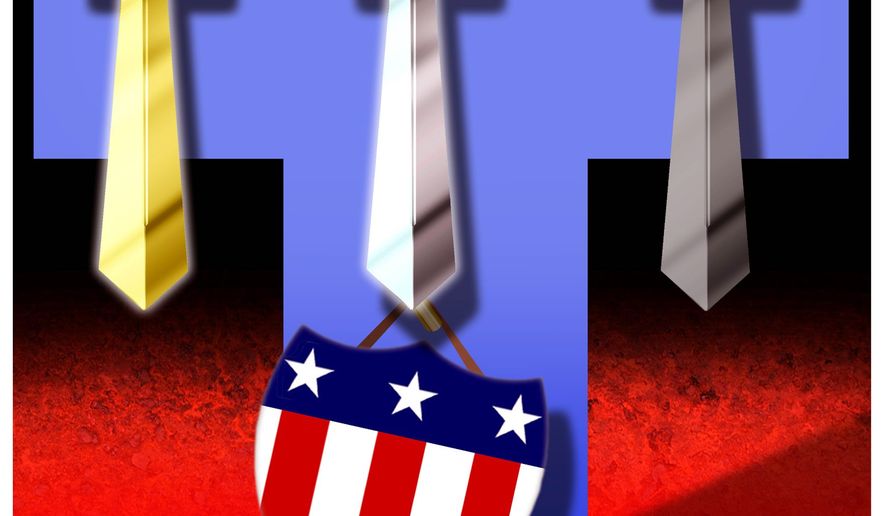OPINION:
The president of the United States has no responsibility more imperative that this: To defend Americans from those intent on doing them harm.
What can we conclude about the current commander in chief’s national security policies halfway through his term? I’d argue that President Trump deserves more credit than his Democratic and Republican #NeverTrump critics give him, but less than his most fervent fans — and the man himself — like to claim.
On the plus side, he has seemed not just willing but eager to confront America’s enemies, adversaries and competitors, to prevent them from making further advances. On the minus side, he has been mercurial, impulsive and too quick to cast modest progress as significant victories.
Most distressing was his decision late last month to withdraw from the battlefield in Syria, where 2,000 highly skilled troops have been doing damage to the Islamic State, and frustrating the ambitions of the Islamic Republic of Iran. Soon after, he indicated that he was pulling half the 14,000 troops out of Afghanistan. In response, Defense Secretary James Mattis submitted his resignation.
On Friday, a White House spokesman said Mr. Trump had “not made a determination” to begin exiting Afghanistan. On Sunday, Sen. Lindsey Graham said he believed the president was now “thinking long and hard about Syria — how to withdraw our forces but at the same time achieve our national security interests.” Second thoughts can be productive thoughts.
A year ago, there were compelling reasons to believe Mr. Trump was on track to achieve more than any of his recent predecessors. He had just delivered a National Security Strategy (NSS) framed as “principled realism” — an attempt to “rethink the policies of the past two decades,” policies that had not produced the results intended.
His NSS recognized the Islamic Republic and North Korean as “rogue regimes.” For four decades, the former has pledged “Death to America!” The latter, ruled by a dynastic despot, has been permitted to develop an estimated 60 nuclear weapons and increasingly sophisticated means to deliver them anywhere, the continental United States very much included.
Russia and China were termed “revisionist powers,” that aim “to shape a world antithetical to U.S. values and interests.” Relations with both have grown worse over recent years despite such initiatives as President Obama’s “reset” with Russia and China’s admission to the World Trade Organization in 2001, the first year of the George W. Bush administration.
The NSS recognized also the threat posed by non-state jihadi groups and the criminal syndicates with whom they’ve been making common cause.
In May of last year, Mr. Trump withdrew from the Joint Comprehensive Plan of Action (JCPOA). The re-imposition of significant sanctions on Tehran followed.
Combined with other instruments of national power, there appeared to be a chance of achieving regime change (though never stated as a goal, that outcome clearly would be welcome), or a change in the regime’s aggressive and illicit behaviors, or at least a return to negotiations that could lead to an agreement that would fulfill fundamental U.S. national security objectives.
American policy toward North Korea also took a new turn. Whereas Mr. Obama’s approach was known as “strategic patience,” a diplomatic euphemism for doing nothing, Mr. Trump engaged.
At first, he threatened and insulted Kim Jong-un. Then he met with him, flattered him, and offered him the carrot of friendly relations and economic assistance, while conveying that the United States carries a big stick, including — but not limited to — “maximum pressure” sanctions.
These efforts have brought a halt to ballistic missile and nuclear weapons testing. However, Mr. Trump’s mission — “complete, verifiable, irreversible denuclearization” — has yet to be accomplished, and the sanctions imposed so far remain less than maximal.
Mr. Trump has begun to rebuild a U.S. military weakened by years of budget cuts, including under “sequestration” which prevented intelligent planning. The military remains, however, seriously under-resourced if the goals are (1) effective deterrence, and (2) ensuring that America can easily overmatch any enemy or combination of enemies.
Though economic sanctions have been imposed on Russia, Vladimir Putin continues to pursue hegemony in lands formerly under the boot of the Soviet and/or Russian empires. He has achieved key objectives in the Middle East, e.g. establishing naval and air bases in Syria.
China’s Communist government for decades has been using cyber weapons to steal hundreds of billions of dollars of American intellectual property. A recent report prepared by the Foundation for Defense of Democracies estimates that Beijing is responsible for 50 percent to 80 percent of cross-border intellectual property theft worldwide, and more than 90 percent of cyber-enabled economic espionage in the United States.
In addition, Beijing has been building islands in the South China Sea and militarizing them in preparation for an eventual challenge to freedom of navigation in Asian waters.
Mr. Trump has made clear that such behavior can no longer be tolerated, much less facilitated by U.S. policy.
The president has shuffled his national security team, but his key advisers have all understood that we cannot transform the states that vex us into Jeffersonian democracies. Nor will we defeat terrorism by declaring it contrary to “international norms.”
A long and low-intensity conflict utilizing all instruments of American power is not a pleasant prospect. But if we continue to let our enemies strengthen, eventually we will face a stark choice: A high-intensity conflict — with nuclear weapons targeting Americans — or allowing authoritarians to dominate a transformed world order.
Mr. Trump’s National Security Strategy outlined the hard work required to make America great again in a turbulent and threatening world. He would be well-advised to re-read it as he contemplates his next two years in the Oval Office.
• Clifford D. May is president of the Foundation for Defense of Democracies and a columnist for The Washington Times.




Please read our comment policy before commenting.